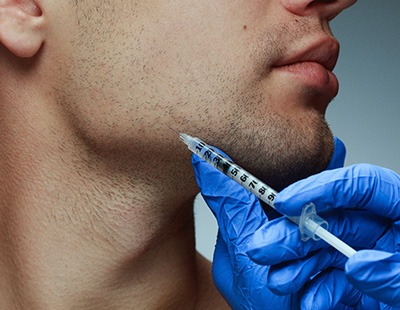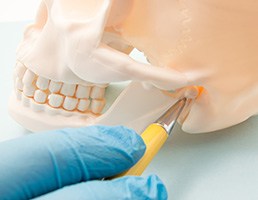TMJ Treatment – Aspen Hill, MD
Find Long-Lasting Relief from Persistent Jaw Pain
Jaw pain, difficulty chewing, and headaches are just a few possible symptoms of TMJ disorder (also known as TMJ dysfunction or TMD). This complex problem can interfere with your quality of life, and if left unaddressed, may persist for months or even years. What can you do to find relief? Contact us to schedule a consultation. We offer multiple types of TMJ treatment in Aspen Hill. Hopefully, we will be able to find a solution that ends your pain once and for all.
Why Choose Dental Center of Aspen Hill for TMJ Treatment?
- Multiple Treatment Options
- Friendly & Experienced Team
- Welcoming, Comfortable Environment
What Is TMJ Disorder?

The temporomandibular joint (TMJ) connects the lower jaw to the rest of your skull. It is one of the most complex and heavily used joints in the human body. Unfortunately, it is also somewhat delicate. When something goes wrong with it or the surrounding tissues, you may experience jaw pain and a range of other unpleasant symptoms.
There are quite a few possible causes of TMD, including stress, physical trauma, bruxism (teeth grinding), a misaligned bite, arthritis, and more. In some cases, the cause remains unknown.
Symptoms of TMJ Disorder

Pain and tenderness in the jaw is one of the most common and noticeable symptoms of TMD. However, it can cause dozens of other symptoms as well. Here are just a few examples of the issues it can contribute to:
- Clicking and popping in the jaw
- Lockjaw
- Earaches and ringing in the ears
- Headaches and migraines
- Difficulty chewing
- Limited mouth movement
- Pain in the shoulders, upper back, and other areas of the body
Types of TMJ Treatment

Before we can determine what type of TMJ treatment is right for you, your dentist in Aspen Hill will need to perform a thorough evaluation. This may include a visual examination as well as the use of advanced imaging equipment, such as a CBCT machine. Once your dentist has an idea of what may be the underlying cause of your TMD, they will be able to recommend your next steps. Some of the treatments that we offer include:
Occlusal Splint

An occlusal splint is a small device that is designed to be worn at night. It prevents involuntary teeth grinding and clenching. It can also shift the jaw slightly forward, helping to relieve tension on the TMJ so the joint can rest comfortably at night.
Equilibration/Occlusal Adjustment

Bite problems are a common cause of TMD. Some bite problems are quite minor. For example, a dental crown or bridge may be slightly too high, or the crest of a tooth may be interfering with your bite. An occlusal adjustment involves making slight alterations to the shape of restorations and teeth so that the upper and lower jaws can work harmoniously together.
BOTOX® Injections

Strategically injected BOTOX® can cause the muscles around the TMJ to relax, allowing the joint to rest and experience pain relief. The effects of BOTOX® can last for several months; periodic maintenance appointments may be recommended. BOTOX® may be a standalone TMJ treatment, or it may be used in conjunction with other therapies.
BOTOX for TMJ Treatment

You may have heard about the many benefits of using BOTOX as a cosmetic treatment, but what many patients don’t realize is that it can also be an extremely safe, effective treatment for TMJ disorders. Injecting BOTOX into tense facial muscles can help them relax, providing months of relief from symptoms like jaw pain, headaches, and other discomforts. BOTOX can also frequently be used in conjunction with other types of TMJ therapies to help create improved outcomes.
TMJ Treatment FAQs
Can TMJ Be Cured Permanently?
Our goal is to help patients find long-lasting symptom relief via TMJ treatment in Aspen Hill. We do so by striving to address the underlying cause of the disorder. For example, equilibration can correct minor discrepancies in your bite, which could lead to lasting results. Consistent use of an occlusal splint can be similarly beneficial.
Of course, it is important to note that TMJ disorder (TMD) may still flare-up occasionally, especially if you get a new injury, face stressful life circumstances, or encounter other situations that could negatively affect the health of your jaw joints.
Can TMJ Be Fixed with Braces or Invisalign?
If your TMJ discomfort results from how your teeth fit together, correcting alignment issues can contribute to symptom improvement. However, braces or Invisalign are not guaranteed to resolve all TMJ cases, since TMD is a complex problem that can arise from a variety of causes.
At our dental practice, we will consider your overall jaw health and dental alignment before recommending orthodontic treatment. We will advise you to move forward with the most conservative TMJ treatment option that we believe would be effective in your unique case.
Is TMJ Treatment Safe?
Your safety is our highest priority when we are providing TMJ treatments. We use evidence-based protocols for occlusal splints, equilibration, and BOTOX injections. These methods have been widely studied and are considered safe for most patients when they are performed by experienced professionals.
During your consultation, our team will review your medical history and customize your treatment plan to address any unique needs. We will also discuss any potential risks so you can have a realistic view of the road ahead. Since the methods we use are non-invasive or minimally invasive, they carry very little chance of a severely bad outcome.
How Long Does It Take for BOTOX Injections to Work for TMJ?
After BOTOX injections for TMJ, you may begin to notice improvement within a few days. Most patients experience significant relief from jaw pain and tension about one to two weeks after treatment. The results can last for several months before follow-up injections become necessary.
We will monitor your progress and adjust your care plan based on your response to BOTOX therapy. Often, BOTOX works best when it is paired with other types of TMJ treatment. It can provide symptom relief, while complementary methods can work to address the underlying cause of your pain.
Can TMJ Disorder Be Treated Without Surgery?
Yes! In fact, the vast majority of TMD cases do not require surgical intervention. BOTOX, equilibration, and occlusal splints are effective for most people.
However, if your TMD is particularly severe or complex, you might need more extensive care. We may have to refer you to a specialist who can evaluate surgical treatment options.





